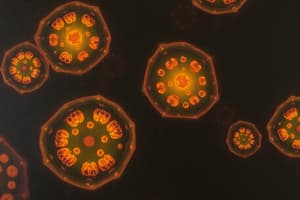Podcast
Questions and Answers
What is the main focus of cell biology?
What is the main focus of cell biology?
Which organelle is responsible for energy production in eukaryotic cells?
Which organelle is responsible for energy production in eukaryotic cells?
What is essential for understanding the continuity of life through reproduction and inheritance?
What is essential for understanding the continuity of life through reproduction and inheritance?
Which structure functions as a specialized compartment within eukaryotic cells?
Which structure functions as a specialized compartment within eukaryotic cells?
Signup and view all the answers
What is fundamental to life's endless variety of forms according to cell biology?
What is fundamental to life's endless variety of forms according to cell biology?
Signup and view all the answers
Why is understanding cellular dynamics crucial in cell biology?
Why is understanding cellular dynamics crucial in cell biology?
Signup and view all the answers
What is a key responsibility of biology research assistants in a laboratory setting?
What is a key responsibility of biology research assistants in a laboratory setting?
Signup and view all the answers
How does undergraduate research benefit both students and science?
How does undergraduate research benefit both students and science?
Signup and view all the answers
What technique allows researchers to observe cells in real-time performing their normal functions?
What technique allows researchers to observe cells in real-time performing their normal functions?
Signup and view all the answers
Which technology enables researchers to visualize cellular structures at the nanometer scale?
Which technology enables researchers to visualize cellular structures at the nanometer scale?
Signup and view all the answers
What is the primary focus of cell biology research as technology advances?
What is the primary focus of cell biology research as technology advances?
Signup and view all the answers
Study Notes
Cell Biology: The Foundational Basis of Life
Cell biology, a branch of biology, explores the fundamental mechanisms and processes that govern life at the subcellular level. At the heart of this discipline lie the interactions and dynamics of cellular components, from the smallest molecules to the complex organelles that drive life's endless variety of forms.
Cellular Components and Organelles
Cell biology delves into the intricate network of structures known as organelles, which function as specialized compartments within eukaryotic cells. These structures include the nucleus, mitochondria, endoplasmic reticulum, Golgi apparatus, and chloroplasts. Understanding organelle function is crucial to comprehending cellular processes, such as protein synthesis, energy production, and signaling.
Cell Division and Growth
Cell biology also investigates the fundamental processes of cell division and growth, which are essential for maintaining life and enabling multicellular organisms to develop and repair tissues. The cell cycle, mitosis, and meiosis are central to understanding these processes, as they are the foundation of life's continuity through reproduction and inheritance.
Communication and Signaling
Cell biology sheds light on the intricate molecular mechanisms governing cellular communication and signaling pathways, which are fundamental to life's endless variety of forms. Understanding these pathways is crucial to comprehending the development, maintenance, and pathological states of cells and tissues.
Cellular Dynamics and Interactions
Cell biology also explores cellular dynamics, the processes by which cells form, interact, and adapt to their environment. Understanding these dynamics is crucial to comprehending the development of multicellular organisms, communication between cells, and the role that cells play in health and disease.
Modern Methods and Techniques
Cell biology research relies on cutting-edge techniques and technologies to probe the mysteries of life at the cellular level. Some of these methods include:
- Confocal microscopy: A high-resolution imaging technique that allows researchers to visualize intracellular structures in three dimensions.
- Flow cytometry: A technique used to measure the physical and chemical properties of cells in a suspension.
- Live-cell imaging: A technique used to observe cells in real-time as they perform their normal functions.
- Gene editing: A technique used to modify the genetic material of cells to study the function of specific genes.
- Super-resolution microscopy: A high-resolution imaging technique that allows researchers to visualize cellular structures at the nanometer scale.
The Role of Biology Research Assistants
Biology research assistants play a vital role in supporting the research efforts of scientists and teams of scientists in a laboratory setting. Their responsibilities include conducting experiments, collecting and analyzing data, maintaining laboratory equipment and supplies, and assisting with the writing of research papers and reports.
The Importance of Undergraduate Research
Undergraduate research provides students with valuable experiences that enhance their critical thinking and problem-solving skills, as well as their motivation to complete their academic programs. Such experiences also benefit science by generating high-quality data that is rigorous and worthy of publication.
The Future of Cell Biology Research
As technology advances, cell biology will continue to evolve. Researchers will explore new techniques and technologies that allow them to probe the mysteries of life at increasingly finer levels of resolution. With the expansion of our understanding of cellular processes, we will gain a deeper appreciation of the complexity and wonder of life.
Studying That Suits You
Use AI to generate personalized quizzes and flashcards to suit your learning preferences.
Description
Explore the essential principles of cell biology, including cellular components and organelles, cell division and growth, communication and signaling, and cellular dynamics and interactions. Discover modern methods and techniques used in cell biology research, the role of biology research assistants, the importance of undergraduate research, and the future of cell biology research.




